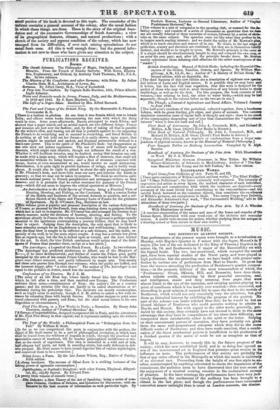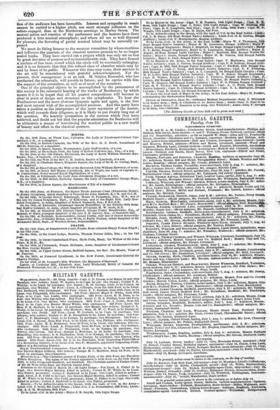MUSI C.
THE BEETHOVEN QUARTET SOCIETY.
THE performances of the present season were brought to a termination on Monday, with Ilaydn's Quartet in F minor with the fugue, Mozart's in F major, (the last of the set dedicated to the King of Prussia,) Haydn's in G minor, Op. 74, and Beethoven's in C major of the Rasomoffsky set with the fugued finale. The two last-mentioned, which occupied the second part, have been especial studies of the Sivori party, and were played in high perfection; but the preceding ones we have heard with greater satis- faction by various sets of performers from Mori to Dando. So great has been the success attending the production of Beethoven's quartet composi- tions,—in the accurate delivery of the most transcendent of which, the "Posthumous," Sivori, &Linton, Hill, and Rousselot, have done them- selves infinite credit, extracting by their powerful execution, zeal, and intelligence, music and deep meaning, from pages that were almost blank to the eye of the musician, and carrying quartet-playing to a point of excellence which it has hardly ever reached,—thus successful, and abounding in good opinion, it seemed fair to open the door to the models of Beethoven, which would not only essentially vary the selections, but give them an historical interest by exhibiting the progress of the quartet. No part of the scheme was better relished than this; for he would be but an absurd idolater of Beethoven who could perceive nothing to admire in Haydn and Mozart. But with regard to the older works generally, pro- duced by this society, they certainly have not showed in them to the same advantage that they have in compositions of ten times their difficulty, nor interpreted them satisfactorily either in the spirit or the letter. Relying on their consummate powers of execution they have probably not given them the same well-proportioned rehearsal which they did to the more difficult works of Beethoven; and thus have made manifest, that a combi- nation of the finest mechanical powers is insufficient to the production of a finished quartet if the union of souls be not as complete as that of fingers. It will be easy, however, to remedy this in the future progress of the society; which has now established itsel4 and in so doing has opened an rem of the instrumental art in England that promises great results in its influence on taste. The performances of this society are probably the first of any series offered in the Metropolis at which the music is unit-ormly of an elevated cast. Proceeding from the height of one fine style to an- other, uninterrupted by anything calculated to excite the impatience of the connoisseur, the audience seem to have discovered that the true secret of the enjoyment of a musical evening consists in the undisturbed ourrent of pleasure. In the later evenings the performances have been very judi- ciously disposed; the excitement of the auditory has been brought to climax in the last piece; and though the performances have terminated somewhat nearer midnight than is usual at London concerti', the Ando', tion of the audience has been insensible. Interest and sympathy in music cannot be carried to a higher pitch, nor exert stronger influence on the artists engaged, than at the Beethoven meetings in Harley Street. The mutual action and reaction of the performers and the hearers have there produced a true musical atmosphere; and where all are so well disposed for pleasure, the flowering of genial musical talent may be naturally ex- pected.
We must do fitting honour to the amateur committee by whose exertions and influence the quartets of the classical masters promise to be no longer sealed books. They have carried out a project which was only set on foot by great devotion of purpose and no inconsiderable risk. They have formed a nucleus of fine taste, round which the circle will be constantly enlarging; and it is no fantastic idea that this refined class of chamber music may by and by boast of its public. Whenever this time may come, their services to the art will be remembered with grateful acknowledgment. For the present, their management is at an end. M. Scipion Rousselot, who has conducted the rehearsals, will preside in future; and he carries with him the support of the committee, as well as of most of the members.
One of the principal objects to be accomplished by the permanence of this society is the reiterated hearing of the works of Beethoven; by which means it is to be hoped that all his quartet compositions will become as clear in point of design and structure as the symphonies. To hear the Posthumous and the more abstruse Quartets again and again, is the first and most natural wish of the accomplished amateur. And this party have taken a position as the interpreters of the inner mysteries of the master, which well rewards their diligence, as it is likely to put rivalry long out of the question. We heartily sympathize in the success which they have achieved, and doubt not but that the popular admiration for Beethoven will be ultimately a means of introducing the musical public to a new world of beauty and effect in the classical quartets.



























 Previous page
Previous page